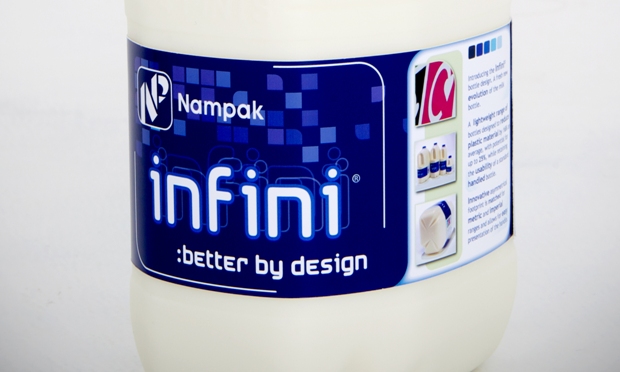
Weighing in at just 32g, the bottle – which is currently undergoing trials with a number of Nampak’s customers – represents a 20% material saving on the standard four-pint version found in most supermarkets today (which weighs 40g), the firm said.
The breakthrough is the latest incarnation of Nampak’s award-winning Infini bottle, which claimed a coveted World Star prize earlier this year and the Best Dairy Packaging Innovation at the Global Dairy Congress in 2012.
According to Nampak, the Infini bottle, which is stocked in a number of major retailers including Marks & Spencer, Morrisons and Sainsbury’s, is “the lightest and strongest bottle” on the market, but further innovation from Nampak’s design and engineering team meant that new achievements were possible.
The firm said that this was due to Infini’s “unique” design characteristics and its ability to be light-weighted easily.
Estimates from Nampak also reveal that a move towards the 32g bottle could herald significant environmental improvements for the wider milk sector.
If the company was to move its entire annual output of two billion bottles to the new lighter Infini, 15,000 tonnes of resin would be saved each year. If the 32g four-pinter was to become the industry standard, it would reduce the overall amount of resin used in UK milk packaging by 30,000 tonnes – a 25% saving, Nampak said.
Eric Collins, managing director of Nampak Plastics, said: “Since its launch in 2012, Infini has been responsible for a paradigm shift in milk packaging, using considerably less material and more recycled plastic than has ever been achieved before. Feedback on Infini from milk processors and retailers has been extremely positive – and we know from extensive research that consumers also prefer the design to the standard bottle.
“However, at Nampak we’re always aiming to push innovation boundaries and our environmental leadership credentials as far as possible. With this in mind, we believe that we’ve reached a new pinnacle with the creation of a 32g four-pint Infini bottle.
“With HDPE lightweight savings of 20% on the industry’s current bottle, it’s greener and more affordable, and performs extremely well in all aspects of the dairy supply chain.”





